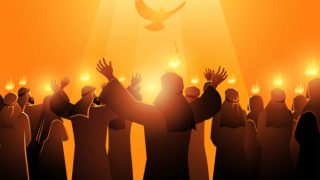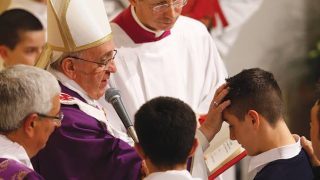
ARE YOU LACKING WINE?
HOMILY FOR THE SECOND SUNDAY IN ORDINARY TIME, YEAR C. Readings: Isaiah 62:1-5; Psalm 96; 1 Corinthians 12:4-11 and John 2:1-11.
At the baptism of the Lord (last Sunday), Christ entered the waters of baptism in order to purify it for our subsequent baptism. And after his baptism, he called those that will work with him and he began his public ministry, which has its focus on the signs or miracles he did. Today’s liturgy expresses the first sign of Jesus in turning water for the purification rites into wine at the wedding feast at Cana, and after this he would turn the wine into what? Isaiah gives a glimpse of this as the glorious future in the first reading.
The first reading from “third Isaiah” which has a message of hope and restoration affirms that Zion and Jerusalem are loved and protected by God. It says, “For Zion’s sake I will not keep silent, and for Jerusalem’s sake I will not rest…” Here, Zion and Jerusalem stand as a representation of Israel and by extension all God’s people. This was after the Babylonian captivity and the prophet Isaiah speaks comfort to the discouraged and downcast citizens. The Lord assures them that He will not rest nor keep silent until Jerusalem is restored. The same way He will never abandon us.
Isaiah expressed the love of God for Zion and Jerusalem in romantic terms as a young man would do to his bride. He said, “You shall be a crown of beauty in the hand of the Lord, a royal diadem in the hand of your God… You shall be called my delight in her and your land married; for the Lord delights in you and your land shall be married.” A day will come when Zion will know the unbroken presence and love of God, as a wife should know the presence and love of her husband. Isaiah depicts the unanimity that characterizes Zion and her intimate union with the Lord, which the book of Revelation 19:7 foresees as ‘the marriage of the Lamb has come and His bride has made herself ready.’ It identifies Christ as the bridegroom and we His people as the bride. We are God’s bride and He takes delight in us. We are His chosen ones and to prove His love for us, He sacrificed His only Son for our sake. The wedding feast at Cana was an introduction to this sacrifice.
The theme of hope and restoration Isaiah gave to the Israelite returning from exile are reflected in the gospel as it presents to us the first among the seven signs of Jesus Christ, restoring wine at the marriage feast of Cana in Galilee. Mary observed the hosts’ wine had finished and said to her Son, “They have no wine.” Jesus said to her, “Woman, my hour has not yet come” and she said to the servants, “Do whatever he tells you.” Wine to the Jewish culture is a symbol of joy and happiness. Psalm 104:15 expresses the function of wine to gladden the heart of man and serves as a symbol of happiness. For the couples to run out of wine at their marriage feast, gives an indication that they had ran out of joy and happiness, and there was no more a reason for celebration. At this point where all hope seemed to be lost, the mother of Jesus intervened. In restoring the wine, Christ restored their joy and happiness as in the case of Israel restored to the land of glory.
Mary played the role of intercessor at the first sign of Christ’s public ministry and Christ in response said, “Woman, my ‘HOUR’ has not yet come.” The response of Christ is so rich theologically. This response refers to Christ’s eschatological fulfillment and especially his glorification through his passion, death, resurrection and ascension. At Christ’s passion narrative, he said, “the ‘HOUR’ has come for the Son of man to be glorified” (Jn 17:1). It is worthy of note that the Blessed Virgin Mary never places herself as the source of God’s blessings in our lives. In an imperative way, she said to the disciples, “Do whatever he tells you.” This is an indication that she is only a channel for us to easily reach Christ, and she calls us to obedience of God’s commandments through her Son.
John went further to tell us, “Now, six stone jars were standing there, for the Jewish rite of purification, which were filled with water.” Traditionally, the jars at the entrance of Jewish homes are meant for washing the legs, which serves as purification rites. It is on this note that we recall the waters of baptism purified for us (last Sunday). We no longer need ordinary water to be purified but Christ who turned water to wine, after which He will turn this wine to His blood at the last supper and this blood will be shed on the cross in order to purify us from sin and grant us salvation. This first sign expresses from beginning to the end of Christ’s public ministry.
St. Paul in the second reading calls us to join Christ in His public ministry to restore joy and happiness to many around us through the gift of the Holy Spirit given to us. The gift varies but the same Spirit, the same Lord and the same God. Let us be agents of love, joy and happiness.
In a romantic way, today’s liturgy expresses God’s love for us as the bridegroom loves the bride and he has given us this Spirit of love to harness our diversities. The liturgy draws our attention to wine that has finished in so many marriages and homes. Inclusively, the lives of individuals. The joy and happiness that usually draws spouses back home after work is no longer there. Some are happy outside and when they return home, they become sad. When marriages and homes have no wine, they practically have no joy and no happiness. We are urged to invite Christ, the special guest at Cana to our homes, who will definitely restore joy and happiness to us. May the good Lord fill our hearts to the brim with the best wine, that there may be no space for shame, disgrace, hatred, malice and quarrels in our lives through Christ our Lord. Amen!
Happy Sunday!
Fr. Ken Dogbo, OSJ











Your comment * Thanks padre for that wonderful homily. God bless your ministry!
Amen! Thanks so much and Gid bless you too
Amen! Thanks so much and God bless you too